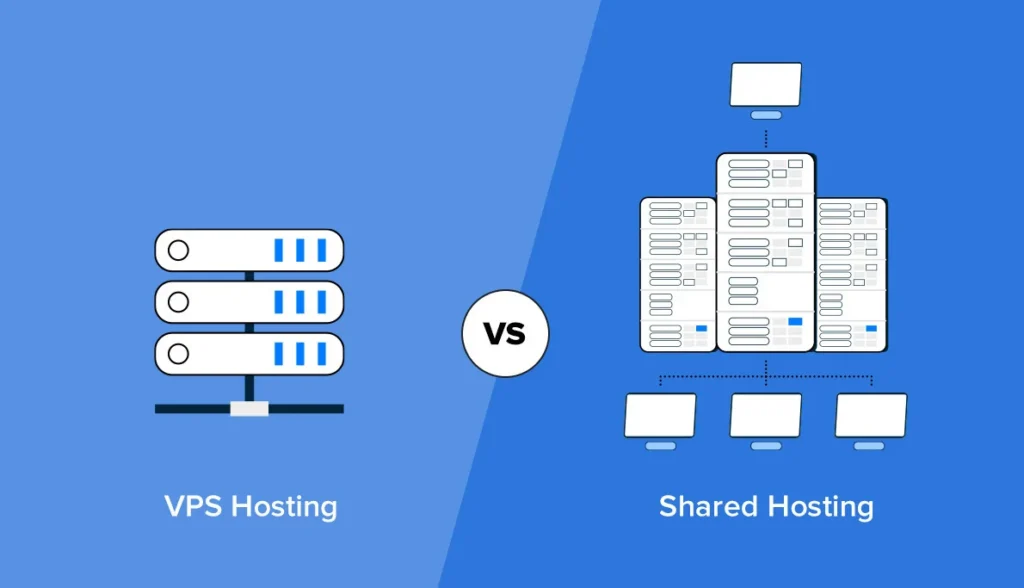When it comes to web hosting, choosing the right type of hosting for your website is essential for ensuring good performance, security, and scalability. Among the most popular hosting options are shared hosting and VPS hosting (Virtual Private Server). Both options have their pros and cons, and selecting the right one depends on your website’s needs, budget, and growth potential.
In this blog, we’ll break down the differences between shared hosting and VPS hosting, explore the advantages of each, and help you decide which option is best suited for your website.
1. What is Shared Hosting?
Shared hosting is the most basic and cost-effective type of web hosting. With shared hosting, your website shares server resources (like CPU, RAM, and disk space) with other websites hosted on the same server. This means that the hosting company takes care of the technical aspects, such as server maintenance, security updates, and software installations, while you focus on your website.
Key Features of Shared Hosting:
-
Cost-effective: Shared hosting is typically the most affordable option, making it a great choice for small websites, blogs, and businesses just starting out.
-
Easy to manage: The hosting provider handles all server management tasks, so you don’t need to worry about configuring or maintaining the server.
-
Limited resources: Since you share resources with other websites, performance can be affected if other sites on the same server experience high traffic or consume more resources.
-
Limited customization: You have limited access to server settings, and customization options are typically restricted to the software provided by the hosting provider.
2. What is VPS Hosting?
VPS hosting stands for Virtual Private Server hosting, where you rent a virtualized section of a physical server. Although multiple websites are hosted on the same physical server, each VPS has its own dedicated portion of resources, such as CPU, RAM, and storage. This means that your website is not directly affected by other websites hosted on the same server, providing more stability and control.
Key Features of VPS Hosting:
-
Dedicated resources: With VPS hosting, your website has its own portion of server resources, ensuring better performance and faster load times, even during traffic spikes.
-
Greater control: You have more control over the server environment and can install custom software, configure settings, and run scripts.
-
Scalability: VPS hosting is more scalable than shared hosting. As your website grows, you can easily upgrade your resources without having to migrate to a new server.
-
More expensive: VPS hosting is generally more expensive than shared hosting due to the additional resources, control, and customization options it offers.
3. Shared Hosting vs. VPS Hosting: Key Differences
While both shared and VPS hosting are excellent options depending on your needs, the differences in resources, control, performance, and price make each suitable for different types of websites.
A. Performance and Reliability
-
Shared Hosting: Since multiple websites share the same server resources, the performance can suffer if one or more sites consume too much bandwidth or processing power. If a website on your server experiences a traffic spike or heavy resource usage, it can impact your website’s load times and uptime.
-
VPS Hosting: With VPS hosting, your resources are allocated exclusively to your website. This means that your performance is not affected by the activities of other websites on the server. If your website experiences a traffic spike, it can still perform well because it has guaranteed resources.
Winner for Performance: VPS Hosting offers better performance and reliability, especially for high-traffic or resource-heavy websites.
B. Security
-
Shared Hosting: Since your website shares a server with other websites, it is more vulnerable to security risks. If one of the websites on the server is compromised, it could potentially impact the other sites sharing the same server. However, hosting providers typically implement basic security measures, such as firewalls and malware scans, to protect all websites on the server.
-
VPS Hosting: VPS hosting offers a higher level of security because each website is isolated within its own virtual environment. This means that if one website is compromised, it won’t affect other websites on the same server. You also have more control over the security settings, allowing you to configure firewalls and other protective measures to suit your needs.
Winner for Security: VPS Hosting provides enhanced security and more control over server-level protection.
C. Control and Customization
-
Shared Hosting: With shared hosting, your control over the server is limited. The hosting provider manages all the server configurations, software, and updates, so customization options are often restricted to the pre-configured features provided by the host. This makes shared hosting more convenient for beginners but less flexible for those with specific technical needs.
-
VPS Hosting: VPS hosting gives you greater control over your server environment. You can install custom software, tweak server settings, and configure your environment to meet the specific needs of your website. This makes VPS hosting a better choice for developers, businesses, or websites that require advanced features and configurations.
Winner for Control: VPS Hosting offers greater control and customization options, making it ideal for those who need flexibility.
D. Scalability
-
Shared Hosting: Shared hosting is not very scalable. If your website outgrows the resources provided by the shared server, you may need to migrate to a new hosting plan or provider. This can lead to downtime and potential complications during the migration process.
-
VPS Hosting: VPS hosting is highly scalable. As your website grows, you can easily upgrade your resources (such as RAM, CPU, or storage) without the need to migrate to a new server. This makes VPS hosting a great option for growing websites with fluctuating traffic needs.
Winner for Scalability: VPS Hosting is the clear winner here, offering easy scalability as your website’s needs grow.
E. Cost
-
Shared Hosting: Shared hosting is the most affordable option, making it ideal for individuals, small businesses, and startups with limited budgets. Shared hosting plans typically start at just a few dollars per month.
-
VPS Hosting: VPS hosting is more expensive than shared hosting due to the dedicated resources and greater control it provides. VPS plans typically start at a higher monthly price point, but the cost is often justified by the improved performance, security, and flexibility.
Winner for Cost: Shared Hosting is more budget-friendly and ideal for smaller websites with limited resources.
4. Which One is Right for You?
A. When to Choose Shared Hosting
-
For small websites: Shared hosting is ideal for personal websites, small blogs, and low-traffic sites. If you’re just starting out and have a tight budget, shared hosting can offer everything you need to get started without the need for advanced features.
-
For those with limited technical knowledge: Shared hosting is easy to set up and doesn’t require any technical expertise. It’s a good option for individuals or businesses who don’t want to manage server settings.
B. When to Choose VPS Hosting
-
For growing websites: VPS hosting is perfect for websites that are growing and need more control, performance, and security. If your website experiences frequent traffic spikes or you require more resources, VPS hosting will help you scale effectively.
-
For businesses and e-commerce sites: If you run a business website or e-commerce store, VPS hosting offers the performance, security, and reliability needed to ensure a smooth user experience and secure transactions.
-
For those needing more customization: If you have specific technical needs, like running custom software, having full control over your server, or managing high-performance applications, VPS hosting is the best choice.
5. Conclusion
Choosing between shared hosting and VPS hosting depends on your website’s needs, budget, and growth expectations. If you’re just starting out or running a small website, shared hosting provides an affordable and easy-to-manage solution. However, if you need more control, better performance, and scalability as your website grows, VPS hosting is the way to go.

